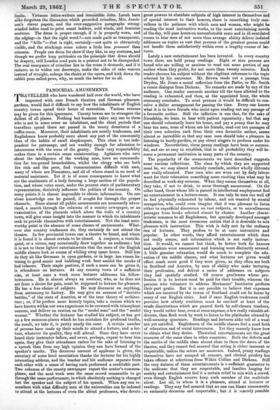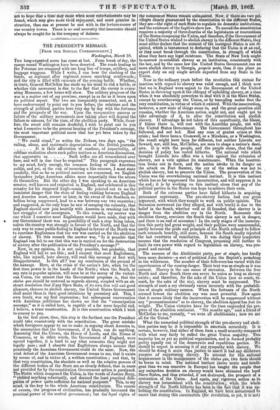PAROCHIAL AMUSEMENTS.
TRAVELLERS who have wandered half over the world, who have inspected with care French theatres and German pleasure- gardens, would find it difficult to say how the inhabitants of English country towns spend their hours of recreation. Various reasons may be given for this ignorance. County towns are to strangers the dullest of all places. Nothing but business takes any one to them who is not in some sense an inhabitant, and the short periods that travellers spend there are passed in the musty dreariness of a coffee-room. Moreover, their inhabitants are mostly tradesmen, and Englishmen know probably more about any part of the community than of the habits of small shopkeepers. This class is too inde- pendent for patronage, and not wealthy enough for admission to intercourse with the mass of the gentry. Their very respectability makes them in a certain sense uninteresting. Agitators who rave about the intelligence of the working man, have no commenda- tion for ten-pound householders, whilst the clergy who see both the rich and the poor, find communication difficult with men, many of whom are Dissenters, and all of whom stand in no need of material assistance. Yet it is of some consequence to know what are the sentiments of a body forming a large section of the popula- tion, and whose votes must, under the present state of parliamentary representation, decisively influence the politics of the country. On many points it is almost impossible to obtain information. On one alone knowledge can be gained, if sought for through the proper channels. Since almost all public amusements are necessarily adver- tized, a search through the columns of a county newspaper, or an examination of the placards which adorn the walls of a country town, will give some insight into the manner in which its inhabitants seek to provide themselves with entertainment. Not the least note- worthy point is the absence of some classes of amusements. What- ever else country tradesmen do, they certainly do not attend the theatre. In few provincial towns can a theatre be found, and where it is found it is almost certain to be closed. A .conjuror, a ventrilo- quist, or a circus, may occasionally draw together an audience; but it is not to these lighter entertainments that the mass of the English middle classes look as means of whiling away spare hours. Still less do they sit like Germans in open gardens, or in large inn rooms lis- tening to good music and imbibing weak beer amidst the smoke of bad tobacco. Their staple pastime, if such a name can be given it, is attendance on lectures. At any country town of a sufficient size, at least once a week some lecturer addresses his fellow- townsmen. He is almost always an amateur, who, as he does not act from a desire for gain, must be supposed to lecture for pleasure. He has a free choice of subjects. He may discourse on anything, from astronomy to history. He may give an account of "decisive battles," of the state of America, or of the trite theory of architec- ture; or, if he prefers more homely topics, take a course which we have known within our own experience to be crowned with triumphant success, and deliver an oration on the "model man" and the "model woman." Whether the lecturer has studied his subject, or has got up a few common-places which he has mistaken for profound truths, the result, we take it, is pretty nearly the same. A certain number of persons have made up their minds to attend a lecture, 'and a lec- ture, whatever its quality, they will attend. Since they have never heard their instructor before, and never, perhaps, expect to hear him again, they give their attendance rather for the sake of listening to a speech than from any high opinion they can have formed of the speaker's merits. The decorous amount of applause is given, the secretary of some local association thanks the lecturer for his highly interesting address, and the teacher and his audience separate from each other with a sense of having each performed a creditable part. Two columns of the county newspaper report the orator's common- places, and the next week sees the same crowd reassemble to go through the same performance, in which absolutely nothing is changed but the speaker and the subject of his speech. When any one re- members with what difficulty men at the universities can be induced to attend at the lectures of even the ablest professors, who devote
great powers to elucidate subjects of high interest in themselves and of special interest to their hearers, there is something truly mar- vellous in the patience with which men and women, who might be reading the most instructive works, or the most entertaining novels of the day, will pass hours on uncomfortable seats and in ill-ventilated rooms to hear men of not more than average ability deliver isolated addresses on topics so vast that persons of the greatest genius could not handle them satisfactorily within even a lengthy course of lec- tures.
Lately a new entertainment has been invented. In every country town there are held penny readings. Eight or nine persons are found who are willing or anxious to read out some portion of any author whom they prefer, for not more than twenty minutes. Each reader chooses his subject without the slightest reference to the topic selected by his successor. Mr. Brown reads out a passage from Dryden, Mr. Jones a moral reflection from the Taller, or Mr. Smith a comic dialogue from Dickens. No remarks are made by any of the audience. One reader succeeds another till the time allotted to the reading is exhausted, and then, at the appointed hour, the whole ceremony concludes. To most persons it would be difficult to con- ceive a duller arrangement for passing the time. Every one knows what it is to have friends who insist upon reading out any passage of a favourite author. Still the infliction is one that, for the sake of friendship, ire learn to bear with patient equanimity ; but that any one should voluntarily leave his home, and pay a penny that he may hear ten men, none of whom are his friends, read out ten passages of their own selection each from their own favourite author, seems almost as incredible as that any sane man should take a pleasure in listening to hurdy-gurdies, or pay street singers to perform under his windows. Nevertheless, these penny readings have been so success- ful, and are so easy to establish, that in all probability they will be- come a permanent institution in many parts of the country.
The popularity of the amusements we have described suggests some curious reflections. The class by which they are supported must be, we may almost certainly conclude, neither wholly illiterate nor really educated. Poor men who are worn out by daily labour want for their relaxation something more exciting than what may be described as week-day sermons. When they amuse themselves at all, they take, if not to drink, to some thorough amusemen,t. On the other hand, those whose life is passed in intellectual employment find no entertainment in a lecture-room. It can only be men too well off to feel physically exhausted by labour, and not wearied by mental occupation, who could even imagine that it was pleasant to listen either to superficial discourses on vast subjects, or to miscellaneous passages from books selected almost by chance. Another charac- teristic common to all Englishmen, but specially developed amongst tradesmen, is the most erroneous notion that it is desirable to inix pleasure with instruction. This wish is fully met by the ordinary run of lectures. They profess to be at once instructive and popular. In other words, they afford entertainment which does not really amuse, and information which is not really instruc- tion. It would, we cannot but think, be better both for bearers and speakers were amusement and learning more distinctly severed. A little genuine relaxation would do much to complete the edu- cation of the middle classes, and what lectures are given would effect much more good if they were given, as they often are both in Scotland and America, by men of ability who make lecturing their profession, and deliver a series of addresses on subjects they had specially studied. Of course gentlemen whose pro- fession it is to lecture must be paid for their trouble, whereas the persons who volunteer to address Mechanics' Institutes perform their part gratis. But it is not possible to believe that expenses which are incurred by the towns of Scotland could not be borne by many of our English cities. And if once English tradesmen could perceive how utterly worthless must be one-half at least of the crude dissertations which are poured forth by self-chosen teachers, they would rather hear, even at some expense, a few really valuable ad- dresses, than flock week by week to listen to the platitudes uttered by well-meaning ignorance. Readings and lectures alike tell of a want not yet satisfied. Englishmen of the middle classes feel a need both of relaxation and of social intercourse. Yet they scarcely know how to obtain what they desire. Theatrical entertainments are the great resource of the same class in other countries. Both the defects and the merits of the middle class almost close to them the doors of the theatre, and they cannot feel assured that acting is either innocent or respectable, unless the actors are amateurs. Indeed, penny readings themselves have not escaped all censure, and clerical prudery has taken offence at selections from Wilkie Collins and Dickens. Still the very dulness of these entertainments is a sufficient guarantee to the audience that they are respectable, and families longing foi. society and entertainment feel it a certain relief to mix with a crowd, even though English reserve keep each member of the multitude silent. Let all, to whom it is a pleasure, attend at lectures or readings. They may feel assured that no one can blame amusements so eminently decorous and respectable ; but it is scarcely possible
not to hope that a time May come when some entertainments may be found, which may give more vivid enjoyment, and more genuine in- struction, than can at present be met ivith in the lecture-rooms of our country towns. There is no real necessity that innocence should always be sought for in the company of dulness:































 Previous page
Previous page